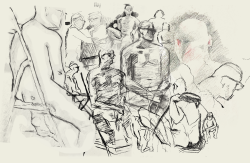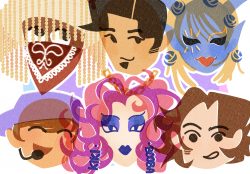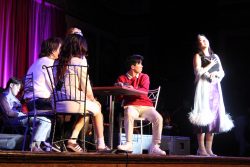Hip-Hop Dancer
Although few freshmen expect Georgetown to foster a hip-hop culture when they first arrive, Groove Theory has always been a crowd-pleaser among students. The student-run dance team embraces all different styles of hip-hop dancers—former gymnasts, ballerinas, cheerleaders, and amateurs combine to create the unique, kickass dance group that is Groove Theory. Aylin Unsal (COL ’13), who has been a member of the team since her freshman year, described the team as “one huge melting pot, almost a microcosm of Georgetown.”
A blend of numerous nationalities, races, and personalities, Groove Theory is entertaining both on and off the stage. “Everybody’s personalities are one of the best parts of the team but can be a major distraction at times during practice,” Unsal said. “But honestly, I think it’s the personalities of the team that keep me and everybody else on the team wanting to practice, open-minded, creative, and basically a family.”
On how they avoid trouble, Unsal said, “Groove Theory has definitely had its share of issues in terms of getting in ‘trouble’. Let’s just say that booty shakin’ and rap music don’t always jive well with some of the faculty on campus. Nonetheless, because we’re busy either choreographing, practicing, or performing (and maybe going to class and Lau on the occasion), we don’t really have that much time to get ourselves in any big trouble.”
—Julia Jester
Philodemician
As besparkled Georgetown biddies roam the streets in a ritual known as “Thirsty Thursday,” a smaller, more noble group of students heads to Healy Hall to debate everything from Iran’s nuclear program to Shakespeare. These members of the Philodemic Society, known as Philodemicians, have carried out the motto “Eloquentiam Libertati Devinctam,” or “Eloquence in Defense of Liberty,” since 1830.
“In a way, Philodemic truly embodies the Georgetown message of cura personalis,” club president Andrew Marsh (COL ’13) said. “Since its inception, the Philodemic has strived to train and sharpen young minds so that when we graduate we’re impassioned to go out and make a mark on the world.”
The Philodemic’s weekly debates are not confined to their room in Healy, as members often continue the discussion over burgers and fries at Martin’s Tavern. While a love of debate and Western business attire brings the group together, “each member shapes the Philodemic with their own ideas, personalities, and talent,” Marsh remarked.
Though Philodemicians walking around campus in seersucker suits and full handlebar mustaches have given the Society a stodgy image in the past, debates like “Resolved: The bro, and not the hipster, represents the greatest threat to Western civilization” show off the society’s lighter side. Huzzah!
—Heather Regen
Theater Kid
On a campus where joining student activities can seem more difficult than getting into college itself, the Georgetown theater community boasts of its openness. “The theater community is super inclusive, we welcome everyone regardless of experience or ability,” said Brendan Quinn (COL ‘14), a theater and psychology major.
That is not to say there is any lack of talent or dedication among these budding stars. Rather, according to Quinn, “it’s a shared commitment and passion to the arts” that makes Georgetown’s student- and department-run productions shine.
Take, Jack Cassou (COL ’15), who got into theater at Georgetown after watching one of his close friends perform in the fall. A bit of envy after seeing the show followed up with a random email to a student director, and a talented stage manager was born.
While encouraged to try his hand at center stage, Jack remained adamant about his choice of behind-the-scenes work. “I’m not creative at all. I can’t be anything but me. I stage-manage. I got into it because of that first show I saw, but I stayed with it because I love the community.”
True to form, Georgetown’s theater community is as diverse as the five co-curricular groups that comprise it. “The only thing that unites us is that were expressive,” Cassau said. “And, oh yeah, we love theater.”
—Mary Borowiec
Politics Junkie
Georgetown recently garnered the distinction of second-most politically active university, and the Voice can only guess this refers to the aspiring politicians flocking from near and far to apply for “Hillternships.” Other hallmarks of the aspiring politician include a strong affiliation with College Democrats or College Republicans, and probably the biggest giveaway is an unhealthy concern for their image—and their security clearance.
The District’s hyperlocal governing body, the Advisory Neighborhood Commission, might seem a logical place for these folks to get some experience representing a constituency. But Jake Sticka (COL ’13), the sole student commissioner on Georgetown’s local ANC, says this experience will not be his foray into the national political scene, describing it as “discouraging for people who cling to their idealism.”
However, these past two years haven’t totally disillusioned Sticka. “I think local government does effect change sometimes,” he said. “I’m not as jaded about local politics as I am about the House of Representatives.”
In fact, Sticka says serving on the ANC has given him the gratifying opportunity to make sure that students are considered “on issues that will affect the University for years to come.”
The biggest downside? “I get a lot of calls from the Voice.”
—Rachel Calvert
Hippie
Georgetown may have made the cut as one of the 10 most hipster schools last year (The Voice is obviously responsible), but the hilltop can still be a tough place for those truly committed to the counterculture. Sydney Browning (COL ‘15) can attest: “It’s like when you’re out on the front lawn hangin’ out and slacklining with your friends and then and then you see the tour go by and you hear them say, ‘And this exhibit is the hippie children. Don’t get too close,’” she says.
Slacklining aside, one look at Browning and her unshaven legs, curly bob and giant round glasses would probably persuade you to label her as a flower child. She it’s her aversion to the razor that draws the most attention.
“I don’t shave my armpits or my legs… and everyone always asks what I’m trying to say by doing that, like what’s my statement… And I don’t know how to respond. It’s just something that I do. It’s like ‘why do you wear glasses and not contacts? Why are you wearing that shirt today?’”
While she laments that campus culture forces her and her fellow granola-crunchers into a “highly specialized niche”, Browning says the ostracization can often be a good thing. In fact, she says it’s great not to be a part of the mainstream at Georgetown.
“It’s all sunshine and happiness and it’s nice to get away and not be a part of the preppy people.”
—Gavin Bade
CSJ Hero
During new students’ first few days on campus, through the endless lectures about Jesuit values and cura personalis, the term “social justice” is thrown around a lot. Fortunately, at Georgetown, it’s more than a buzzword featured on orientation booklets.
The University’s emphasis on social justice draws students passionate about service, education, international support, and worker’s rights, and these interests are supported by the Center for Social Justice.
While Thomas Scharff (COL’12), came to Georgetown already interested in service, he said that the CSJ and the University’s student culture made service a more meaningful experience. “The energy and the commitment that people have to honoring human dignity and the way they model those values volunteering … it wouldn’t have been what it was without the direct link of all of us together working in the context of something larger,” Scharff said.
Other students lead non-profit organizations independent of the University. Alissa Orlando (SFS ’13) is the COO of the Hilltop Microfinance Initiative and started its Citizenship Fund program, providing money for citizenship applications. But even she emphasizes that she owes all of her accomplishments to her fellow students. “Even more than the institutional philosophies are the people,” Orlando said. “[I]f you’re at an institution such as Georgetown with a class of incredibly amazing and inspired individuals … it’s much easier to let that passion flourish.”
—Connor Jones
Hoya Blue
While all prospective Hoyas check college rankings to ensure an elite education, the students who make up Hoya Blue, Georgetown’s pep club, care just as much, if not more, about our performance on the court as our achievements in the classroom. Though it hasn’t yet been determined whether their blood is actually blue and gray, members of Hoya Blue have “Hoya Saxa” tattooed on their hearts and blue and gray covering their souls, and onesies, and wigs, and shot glasses, and pong tables–you get the picture.
For the match against Villanova, Mary Ellen Curran (COL ’13) covered herself in silver paint and Lady GaGa-esque eyelashes. “I was told I looked like Buzz Light Year, a scary tin man, and just plain freaking awesome—which I am,” Curran said. Such outbursts of spirit are not out of the norm.
Whether it’s getting up at 6 a.m. to get front row seats at the Verizon Center or pregaming in the rain for a women’s field hockey scrimmage, Hoya sports fanatics always exude school spirit. According to Adam Ramadan (SFS ’14) school spirit is “a rallying point, something that unites all of us at any point in time.” As Hoya Blue has figured out, nothing brings Hoyas together like a basketball game—except maybe a game of survivor flip cup.
—Keaton Hoffman
International Student
With over 2,000 students hailing from 132 countries, Georgetown prides itself on its international student body. Thanks to the variety of opportunities Georgetown offers to overseas students, it is common for them to start thinking of the Hilltop as their home. “Through academics, the student community, and the staff, the University is able to build this community and integrate international students well,” said Quintin Eusebio (MSB ’13), who came to Georgetown from the Philippines.
And integrate they do. Watching Christopher Stromeyer (SFS ’14) walking over to class with his distinguishable European scarf-over-a-blazer-and-V-neck-shirt look, one would picture him strolling along the Seine rather than going over to Leo’s. At the same time, he’s far from an outsider: “I have assimilated so many things from American culture. I love going to American football games. I’ve grown used to using the word ‘soccer,’ and I even say ‘y’all.’”
However hard it may seem at first to get used to the American way of life, the transition to college brings the same joys to international students as it does to Americans. “You just have to open up and embrace the culture,” Eusebio said. “In the end, with its pros and cons, we all fall in love with Georgetown.”
—Lucia He




